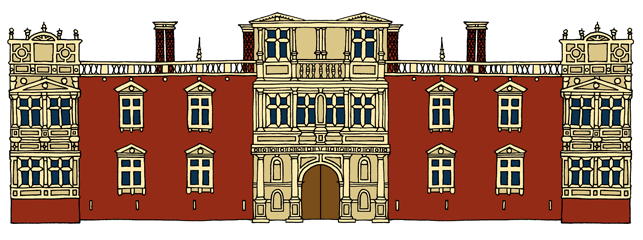|
Kids Home
London
Royalty
Romans
Early
Kingdoms
Berkshire
Teacher's Page
Mail David


|
|

in Tudor & Stuart London

- Old Somerset House stood
on the site of the present Somerset House, on the the Strand, at the
end of Waterloo Bridge (although the bridge was only built in 1811).
- It was the ultimate rich man's
house. It was built in 1547 for Edward
Seymour, the Duke of Somerset
and the Lord Protector who ruled England for his young nephew, King Edward
VI.
- It was the first Renaissance
palace to be built in England. Its architect was either John of Padua
or Sir Thomas Thynne.
- Lots of buildings were
demolished to make way for it. These included two bishops' palaces and
a church.
- The stone for the building came
from the defunct St. John's Priory in Clerkenwell. The builders also tried to take some
stone from St. Margaret's Church in Westminster, but the parishioners chased
them away.
- When the Duke was executed, the
house was given to Princess Elizabeth (later Queen Elizabeth I). She
lived there sometimes during her sister Queen Mary's reign. Catholic
Mary did not trust her sister and searched the house to try and prove
she was a Protestant.
- In King James I's reign, it
became the home of his wife, Anne of Denmark. It was called Denmark
House for a while. There were lots of fabulous parties there, called
'masked balls'. They were organised by Ben Johnson and Inigo Jones.
- It later became the home of her
daughter-in-law, Charles I's queen, Henrietta Maria. She was French.
She had her own private Catholic Chapel there at a time when England
was Protestant.
- After the Civil War, Catherine
of Braganza, often lived there. She was the queen of King Charles II.
She arranged for the first performance of Italian opera in England to
take place there.
- After she left in 1693, Royal
servants were allowed to live in Somerset House for nearly a hundred
years. It was demolished in 1775. The present house was built to
replace it. It became Government Offices.
|
|

